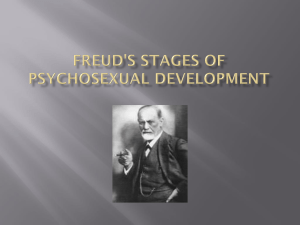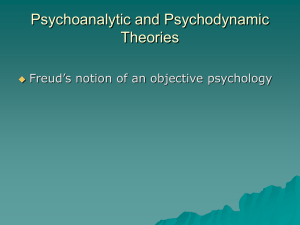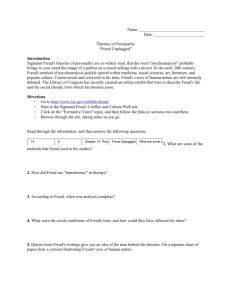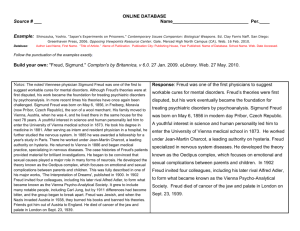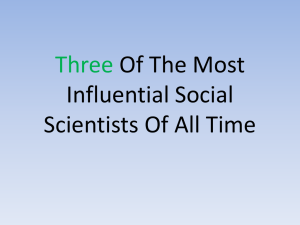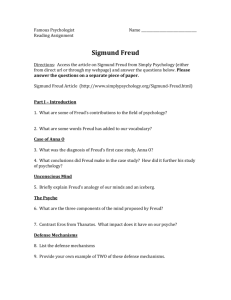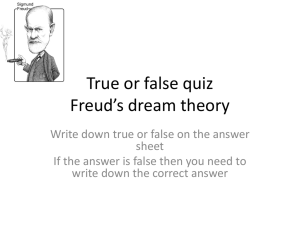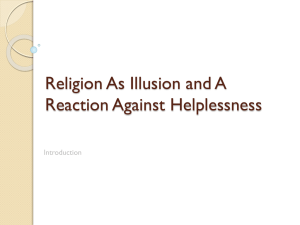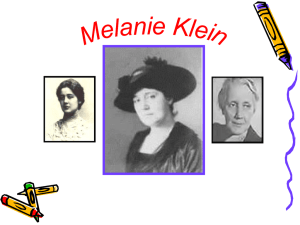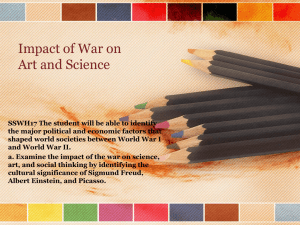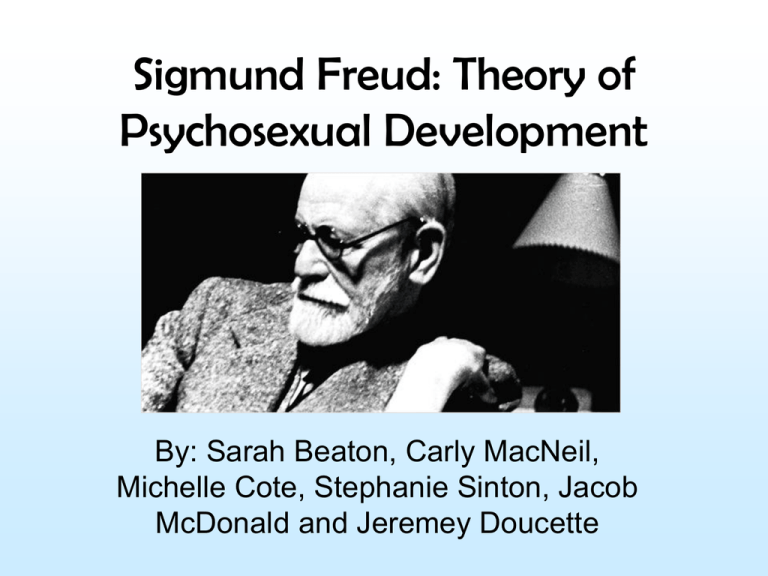
Sigmund Freud: Theory of
Psychosexual Development
By: Sarah Beaton, Carly MacNeil,
Michelle Cote, Stephanie Sinton, Jacob
McDonald and Jeremey Doucette
Biography
• Born May 6th, 1856 in Freiberg,
Moravia. Which was in the
Austrian Empire, known now as
the Czech Republic.
• By the age of 8, he could read
Shakespeare.
•He attended the University of Vienna,
graduating in 1881 with a degree in medicine.
•In 1903, he founded the Vienna
Psychoanalytical Circle, and by 1906 branches
were established in several other countries.
Biography (cnt’d)
• Freud took up work at
Theodor Meynert's Psychiatric
Clinic…
• It was here when he began
experimenting with the drug,
Cocaine.
• He believed that this drug
would become a common
treatment for depression and
indigestion.
• He hoped it would cure mental
illness by stimulating or
modifying the sinus area.
Biography (cnt’d)
• As he was inventing and refining his field of
"psychoanalysis", Freud was becoming
convinced of the connection between
neurosis and sexual conflict.
• He believed that a large portion of his
patients probably were suffering from
sexually related conflicts.
• After a life of successful studies, he died in
1938.
Freud’s Theories
• Freud believed that personality
develops through a series of
childhood stages during which
the pleasure-seeking energies
of the self become focused on
certain “erotic” areas.
• This psychosexual energy, or
“libido”, was described as the
driving force behind behavior.
• If the stages are completed
successfully, the result is a
healthy personality.
Theories (cnt’d)
• If certain issues are not resolved at the appropriate
stage, fixation can occur. A fixation is a continuous
focus on an earlier psychosexual stage.
• Until this conflict is resolved, the individual will
remain "stuck" in this stage. For example, a person
who is fixated at the oral stage may be overdependent on others and may seek oral
stimulation through smoking, drinking, or eating.
• During the oral stage, the infant's primary source
of interaction occurs through the mouth, so the
rooting and sucking reflex is especially important.
Theories (cnt’d)
• During the anal stage, Freud
believed that the primary focus of
the libido was controlling bladder
and bowel movements.
• The major conflict at this stage is
toilet training, the child has to
learn to control his or her bodily
needs.
• Developing this control leads to a
sense of accomplishment and
independence.
Theories (cnt’d)
• During the phallic stage, the primary focus of the
libido is on the genitals. Children also discover the
differences between males and females. Freud also
believed that boys begin to view their fathers as a
rival for the mother’s affections.
• During the latent period, the development of the ego
and superego contribute to a period of calm.
• The stage begins around the time that children enter
into school and become more concerned with peer
relationships, hobbies, and other interests.
• The latent period is a time of exploration in which the
sexual energy is still present, but it is directed into
other areas.
Theories (cnt’d)
• During the final stage of psychosexual
development, the genital stage, the
individual develops a strong sexual interest
in the opposite sex.
• Interest in the welfare of others grows during
this stage.
• If the other stages have been completed
successfully, the individual should now be
well-balanced, warm, and caring. The goal of
this stage is to establish a balance between
the various life areas.
Freud Critics
• Much criticism of Freud comes from the way his
theories are portrayed in the popular
imagination, partly from a still-lingering negative
image about sex.
• There is often the suggestion that his early
psychoanalytic theory mentioned that humans
were comprised of selected brain structures
upon which new rational and ethical structures
were somehow imposed.
Freud’s Critics (cnt’d)
• During Freud’s time, society disagreed with
his theory because it seemed out of the
ordinary and they were sexually repressed.
• The conflict between the ID and the ego is
no more than what is nowadays described
as the nature-nurture debate, the tension
between biology and environment.
Video
http://www.youtube.com/watch?v=cvOoYX45G_0
Works Cited
• http://www.nndb.com/people/736/000029649/
• http://psychology.about.com/od/theoriesofperson
ality/ss/psychosexualdev.htm
• http://www.gender.org.uk/about/01psanal/11_fre
ud.htm
• Random House Webster’s Dictionary of
Scientists Ref 509.2 HUT
• Quantum Leaps 100 Scientists who Changed
The World Ref 509 BAL



